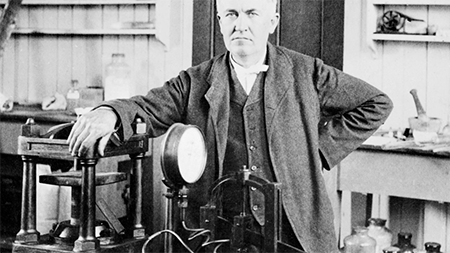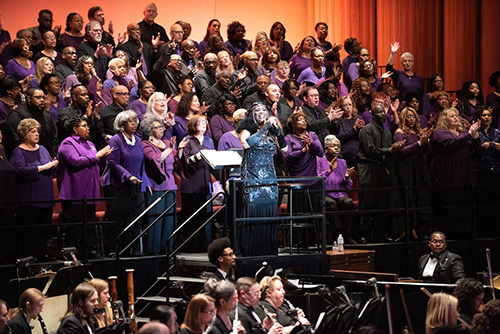HAPPENING THIS WEEKEND:
A number of Black History Month events are scheduled for Saturday. At 7:30, the Akron Symphony (pictured) will celebrate the 30th anniversary of Gospel Meets Symphony, the Oberlin Artist Recital Series will present Trey McLaughlin & The Sounds of Zamar (preceded at 4 by a Community Gospel Singing Workshop), and also at 7:30, Christian McBride will host The Movement Revisited, an epic concert event at the Maltz PAC honoring Civil Rights icons Rosa Parks, Malcolm X, Muhammad Ali, Martin Luther King Jr. and former President Barack Obama.
Other orchestral performances include The Cleveland Orchestra in Beethoven’s Fifth and Schubert’s Sixth with guest conductor Jukka-Pekka Saraste on Saturday at 8, and Sunday at 3 (both are now sold out), the final pair of CityMusic Cleveland “Symphony of Secrets” programs led by Brendan Slocumb on Saturday at 7:30 in Rocky River and Sunday at 4 in Akron, and your choice of the Suburban Symphony in Mahler’s Fourth under Martin Kessler or Heights Chamber Orchestra with hornist Richard King under Travis Jürgenson, both on Sunday at 3:30.
Also on Sunday, at 4 pm, Les Délices will present harpsichordist Mark Edwards in Bach’s “Goldberg Variations” at First Congregational in Hudson, and Oberlin will present a faculty recital on Sunday at 7:30 by the Verona Quartet with pianist Angela Cheng.
And off the beaten path, Oberlin’s 60-minute TIMARA event led by percussionist Ross Karre will feature “ homemade percussion instruments, subtle drones, energetic rhythms, live electronic music, and video projections” on Saturday at 1 pm at the Birenbaum, and the CIM New Music Ensemble will showcase works by composer Carlos Sanchez- Gutierrez on Sunday at 2 at the Art Museum.
Visit our Concert Listings for details.
ANNOUNCEMENTS:
The Assembly for the Arts writes: “With the support of City Council, the City has announced the Transformative Arts Fund, a $3M investment in artist-led public art initiatives. Cleveland artists, in collaboration with a city-based institutional partner, now have the opportunity to apply for funds to create innovative, thought-provoking, and inclusive Cleveland-centric public art projects that ignite inspiration, foster dialogue, and drive social transformation. Between 6 and 12 projects will be awarded between $250,000 and $500,000. Applications are open until March 30, 2024. Visit the City’s website to learn more, view the application, and sign up to attend an upcoming information session.” Click here to read the announcement.
WEEKEND ALMANAC:
February 10 — by Jarrett Hoffman

On the occasion of Price’s 90th birthday, Tom Huizenga wrote for NPR that “over years of interviewing singers and critics, whenever Price’s name comes up, something special happens. The talk turns to that powerful, gleaming voice and the strength of her artistic convictions, even in the face of adversity.”
That article also contains thoughts from the late, great Jessye Norman, who shared her experience listening to recordings of Price in Verdi’s Il trovatore with frequent collaborator Herbert von Karajan at the Salzburg Festival. As Norman points out, sometimes a lack of words provides a better description than words themselves:
…that is truly, truly, truly great singing. And because it is what it is, it is more than simple singing. It is much more than that. Whatever those words should be, I don’t have them this moment, but it’s far more than singing.
Listen to Price in the aria “D’amor sull’ali rosee,” especially towards the end, to discover what an apt description that is.
February 11 — by Mike Telin

Of all his inventions, Edison’s favorite was the phonograph, which came about from his work on the telegraph and the telephone when, in 1877, he discovered a way to record sound on tinfoil-coated cylinders. He set the invention aside for ten years, and when he returned to work on his phonograph, he began using wax cylinders.
And what were the first words Edison recorded on his new machine? Click here to listen to him recite “Mary had a little lamb” (recorded in 1927 for the 50th anniversary of his invention). Upon hearing his voice Edison said “I was never so taken aback in my life — I was always afraid of things that worked the first time.”
Edison believed the phonograph would eventually be used for letter writing and dictation, phonographic books for blind people, a family record — recording family members in their own voices — music boxes and toys, clocks that announce the time, and a connection with the telephone so communications could be recorded. Click here to visit the informative entries about Edison on the Library of Congress website.
Always striving to improve on things, Edison was once asked to give his opinion on the role that physics and mechanical instruments will play in the future. “A great deal — an enormous part,” the inventor responded. “The present instruments of the orchestra are very crude. Take the violin for instance. Don’t tell me that even the best violin cannot be improved. One of the worst things in all music in the E string on the violin.” Click here to read the interview titled New Aspects on the Art of Music.
So happy 177th Mr. Edison! Without you, nothing I’ve written about in this article would be possible.
I leave you with an inspiring quote by Thomas Edison. “Our greatest weakness lies in giving up. The most certain way to succeed is always to try just one more time.”



